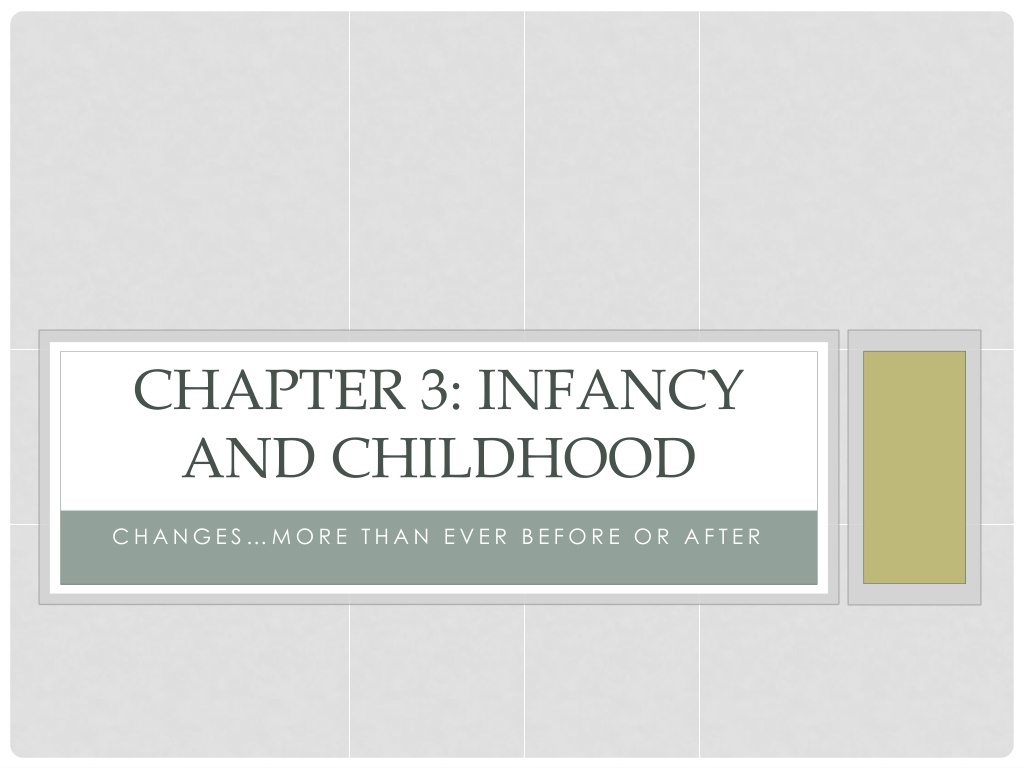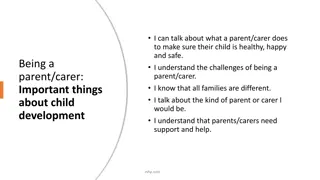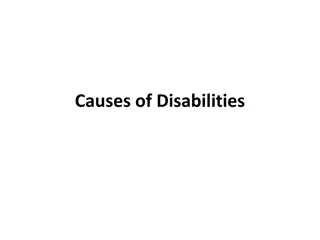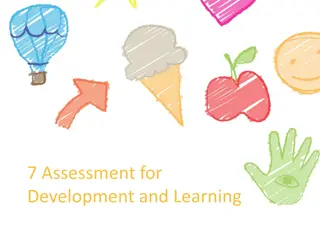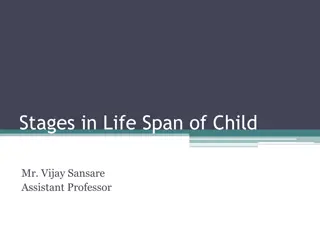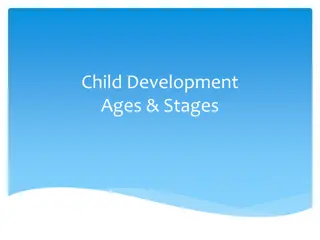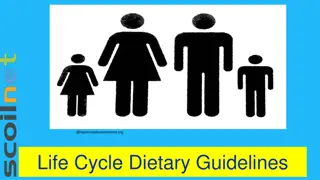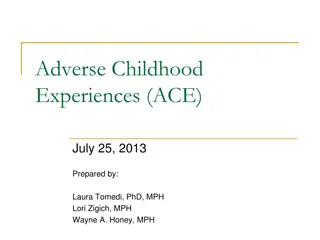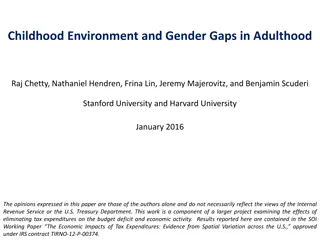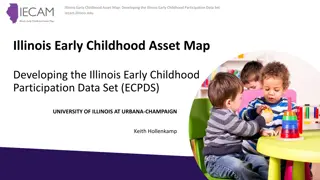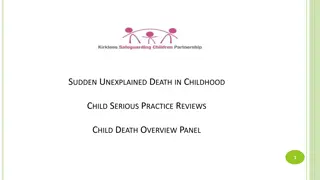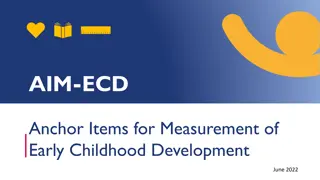Exploring Infancy and Childhood Development
Developmental psychology delves into the changes individuals experience as they mature, from newborn reflexes to cognitive and emotional growth. Physical maturation, perceptual preferences, language acquisition, and cognitive developmental stages are all integral aspects shaping an individual's early years. Understanding the intricacies of these developmental milestones aids in nurturing and guiding children through their formative years.
Download Presentation

Please find below an Image/Link to download the presentation.
The content on the website is provided AS IS for your information and personal use only. It may not be sold, licensed, or shared on other websites without obtaining consent from the author. Download presentation by click this link. If you encounter any issues during the download, it is possible that the publisher has removed the file from their server.
E N D
Presentation Transcript
CHAPTER 3: INFANCY AND CHILDHOOD C HA NGES M O R E THA N EVER B EF O R E O R A F TER
DEVELOPMENTAL PSYCHOLOGY Def: the study of changes that occur as an individual matures
NEWBORN CAPACITIES GRASPING REFLEX: cling response when palm is touched ROOTING REFLEX: when touched near the mouth, infant will move mouth in direction of sensation SUCKING REFLEX MORO (STARTLE) REFLEX: arms spread out at right angles to body and legs spread out when startled
PHYSICAL DEVELOPMENT Avg length of newborn: 18-22 inches MATURATION: the internally programmed growth of a child LEARNING: relatively permanent change in behavior resulting from responses that change as a result of experience Don t force learning Maturational readiness
PERCEPTUAL DEVELOPMENT Infants prefer looking at human faces or patterned materials They benefit from touch Generally unafraid due to lack of experience (Visual Cliff)
LANGUAGE DEVELOPMENT 1STyear: crying, cooing, babbling, native babbling Toward 2ndyear: primitive words 1stwords are things they can see and touch MA BA DA
LANGUAGE CONTINUED End of 2nd year: 500- 1500 word vocab.; begin 2-word phrases TELEGRAPHIC SPEECH: verbal utterances where words are left out but meaning is clear Overgeneralization: improperly applying grammatical rules Grammar: rules for arranging symbols to produce meaning MY MOM ME NO LIKE PUTTED THIS STUPID HAT ON ME
SECTION 2: COGNITIVE AND EMOTIONAL DEVELOPMENT
COGNITIVE DEVELOPMENT Jean Piaget Showed that intellectual development involves quantitative and qualitative changes
HOW KNOWING CHANGES SCHEMA: conceptual framework a person uses to make sense of the world ASSIMILATION: process of fitting objects and experiences into one s schemas ACCOMMODATION: adjustment of one s schemas to include newly observed events and experiences
OBJECT PERMANENCE Def: a child s realization that an object exists even when he/she cannot see or touch it Usually obtained by 12-18 months
REPRESENTATIONAL THOUGHT Def: the intellectual ability of a child to picture something in his/her mind This means we have begun to use symbols Language can now develop
PRINCIPLE OF CONSERVATION Def: a given quantity does not change when its appearance is changed Acquired by age 7 EGOCENTRIC: a young child s inability to understand another person s perspective
PIAGETS STAGES OF COGNITIVE DEVELOPMENT 1) Sensorimotor stage: birth-2; simple motor responses to stimuli 2) Preoperational stage: 2-7; egocentric; uses symbols to solve simple problems or to talk about things not present
STAGES OF COG DEV CONTINUED 3) Concrete operational: 7-11; organized and rational thinking; struggle w/hypotheticals 4) Formal operational: 11-on; understands abstract ideas and hypotheticals We all follow the same order but at different times
EXPERIMENTS WITH ANIMALS
IMPRINTING Def: inherited tendencies or responses that are displayed by newborn animals when they encounter new stimuli
IMPRINTING CONTINUED Idea from Konrad Lorenz (geese) Critical period: a specific time in development when certain skills or abilities are most easily learned
SURROGATE MOTHERS Harry Harlow What makes the mother so important? Discovered touch or contact comfort was more important than biological needs (mother s love)
HUMAN INFANTS Form attachment around 6 months Strong from 6 months to 3 years Separation causes separation anxiety Around strangers, stranger anxiety
ATTACHMENT Mary Ainsworth s Strange Situation 3 patterns of attachment: 1) Secure child willing to explore 2) Avoidant avoid/ignore mom when she returns 3) Anxious/Ambivalent not upset when mom leaves, but rejects her upon return
SECTION 3: PARENTING STYLES AND SOCIAL DEVELOPMENT
PARENTING STYLES 1) Authoritarian: parents control and evaluate behavior and attitudes of children in accordance with a set code of conduct 2) Democratic: children participate in decisions that affect their lives (aka: Authoritative)
PARENTING STYLES CONTINUED 3) Permissive/Laissez- faire: children have final say; parents are non-punishing 4) Uninvolved: parents are uncommitted to role of parent
EFFECTS OF PARENTING STYLES Authoritative produces more confident kids It establishes limits Allows children to assume responsibility gradually Able to identify with parents
CHILD ABUSE Physical or mental injury, sexual abuse, negligence Child must be under age of 18 Various causes Stress is most prevalent cause Can create: loss of trust, feelings of guilt, antisocial behavior, depression, identity confusion, etc
SOCIALIZATION Def: the process of learning the rules of behavior of the culture within which an individual is born and will live Involves learning to live with others Learning the rules
FREUDS THEORY OF PSYCHOSEXUAL DEVELOPMENT Freud: children are born with strong sexual and aggressive urges Learning to control these urges leads to learning difference between right and wrong
1ST STAGE: THE ORAL STAGE 1st 18 months Pleasure is obtained through the mouth (breastfeeding) Weaning from nursing can cause conflict Conflict results in an oral fixation later in life
2ND STAGE: ANAL STAGE C. 1.5-3 years old Pleasure obtained through the anus Toilet training teaches to curb freedom and establish social control
3RD STAGE: PHALLIC STAGE Between ages 3-5 Child becomes aware of gender differences Child becomes rival for the affections of the parent of the opposite sex IDENTIFICATION: process by which a child adopts the values and principles of the same-sex parents Conflict can lead to Oedipus/Elektra Complex
4TH STAGE: LATENCY STAGE C. age 5-6 Sexual desires pushed back Focus on exploration and learning SUBLIMATION: process of redirecting sexual impulses into learning tasks
5TH STAGE: GENITAL STAGE Adolescence to adulthood One gets as much satisfaction from giving pleasure as from receiving it Sexual desires renewed Seek relationships with others
ERIK ERIKSONS THEORY OF PSYCHOSOCIAL DEVELOPMENT Emphasizes need for social approval We face specific crises at certain points in life As we age, more is expected from us We develop according to how people respond to us
LEARNING THEORIES OF DEVELOPMENT We learn social rules b/c we are rewarded for conforming Social development is due to conditioning and imitation
COGNITIVE-DEVELOPMENTAL APPROACH Social development is due to the child acting on the environment Trying to make sense out of experience Children s games show this
GAMES AND PLAY Games and playing offer a way for kids to learn for themselves Playing creates a small society Experience, NOT winning, is what counts
GAMES AND PLAY CONTINUED ROLE TAKING: children s play that involves assuming adult roles, thus enabling the child to experience different points of view
MORAL DEVELOPMENT Lawrence Kohlberg Posed moral questions to different age groups Examined the child s reasoning Created 6 stages of moral development
PRE-CONVENTIONAL: STAGE 1 Child is totally egocentric Main concern is avoiding punishment No real sense of right and wrong
PRECONVENTIONAL: STAGE 2 Child learns how to receive rewards Believe Golden Rule is quid pro quo Still egocentric Evaluate acts in terms of consequences
CONVENTIONAL: STAGE 1 Child becomes sensitive to other people Want social approval Apply rules rigidly and literally
CONVENTIONAL: STAGE 2 Key issue is law and order Strong belief in established authority
POST-CONVENTIONAL: STAGE 1 Is the law fair? Belief that laws must change to fit the changing world Is the law good for society?
POST-CONVENTIONAL: STAGE 2 Acceptance of ethical principles that apply to everyone Moral imperatives, like the Golden Rule, cannot be broken
GENDER BIAS IN KOHLBERGS THEORY Females are raised to be empathetic Boys are taught the goals of justice This puts males at a higher level of moral development
